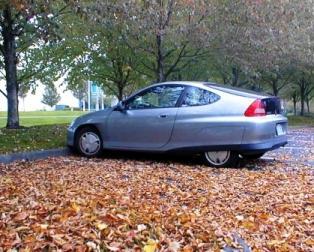
If you're planning on buying a new car, consider getting a plug in hybrid electric vehicle, or PHEV. If most of the driving you do is local, you may not have to visit the gas pump more than few times a year.
Hybrids and Plug In Hybrids
You've most likely heard about hybrid vehicles in these days of higher gas prices. So what's the difference between a standard hybrid and a PHEV? And how is a PHEV better than fully electric vehicle right now? All will help you reduce your consumption of gasoline and get better miles to the gallon, but there are some pretty big differences between them.
Standard Hybrids
A standard hybrid, such as the Toyota Prius, has both a fuel tank and an electric motor with a battery. The electric motor allows the car to pull fuel from the battery to accelerate, as well as from the gas tank. As you drive, this electric motor continuously recharges the battery through kinetic energy such as when you apply the brakes.
Plug In Hybrid Electric Vehicle
A PHEV on the other hand, uses its electric motor almost exclusively until the battery is drained, before it switches to the gasoline fuel tank. You can plug the car into any 120v outlet to charge, and if your only driving across town to pick up the kids or groceries, you may not use any gasoline at all.
Electric Vehicles
Someday a solely electric vehicle may be the best way to go, but at the moment there aren't that many on the market, nor are they extremely practical. Since the car runs solely on electricity, when it's time to re-fuel you can simply pull into a re-fueling station since the car will need to be plugged in for an extended amount of time. This can make longer trips a rarity without some serious planning ahead.
The Benefits of a Plug In Hybrid
There are several benefits to using a plug in hybrid vehicle, both for you and for the environment. Choosing this type of vehicle over standard cars, standard hybrids or electric cars can offer you the following:
You Don't Have to Plug it In
If you are traveling across country, and you don't know if you'll be able to charge your car overnight at the hotel, you don't have to worry. The car can run on gasoline alone if need be.
100 Plus Miles to the Gallon
100 miles a gallon may sound too good to be true, but with a PHEV, it's a fact. If you are careful to keep your car charged whenever it's home in your driveway you can achieve more than 100 miles to the gallon. In fact if you do most of your driving around town in short trips, you may not need any gasoline at all.
Green Even When Plugged In
There has been some controversy about whether or not a plug in vehicle is truly green, since it uses electricity which is generate from coal plants. A study done in 2007 shows that PHEV's will reduce emissions if used widely enough. In fact, as we clean up our power plants, PHEV's will just get greener over time.
Cheaper to Run and Maintain
Many communities have a lower electricity cost overnight. This means that by plugging your PHEV in every evening you are lowering your costs to run it, not just through the use of less gasoline and without the oil and gas constantly flowing through your engine, your vehicle can last a very long time.
Costs of Plug In Hybrids
Many companies are already producing PHEV's for sale. They are not yet as popular as standard hybrids, partly due to the cost. A PHEV will run about $3,000 more for a sedan and $5,000 more for an SUV. The savings over time can make up the difference in a big way.
If you are planning on buying a new car and are looking into hybrids, talk to your dealer about the possibility of a plug in hybrid electric vehicle. The benefit to you and to the environment is well worth the extra price tag.







